- Home
- Roy J. Snell
The Crystal Ball Page 7
The Crystal Ball Read online
Page 7
CHAPTER VII THE BRIGHT SHAWL
When Jeanne left that place of many gypsies who were not gypsies, shequickly lost herself in the throng that ever jams the narrow sidewalks onMaxwell Street. She was glad, for the moment, to be away from that place.It somehow frightened her. But she would go back; this she knew. When oneis looking for a certain person, one looks into many faces, to at lastexclaim, "This is the one!" Jeanne was looking for a certain thievinggypsy woman. She must look into many gypsy faces.
But now, pushed this way, then that by the throng, she listened with deafears, as she had often done before, to the many strange cries andentreaties about her. "Lady, buy this! Buy this and wear diamonds." "Shoestrings, five cents a dozen! Shoe strings!" "Nize ripe bananas!" "Here,lady, look! Look! A fine coat with Persian lamb collar, only seventeendollars!" The cries increased as she passed through the thick of it. Thenthey began to quiet down.
As she looked ahead, Jeanne spied a crowd thicker than all the rest. Itcentered about a rough board stand. Since she was a small child Jeannehad been unable to resist crowds. She pressed forward until she was inthe thick of this one.
Just then a man mounted to the platform, took up a microphone and beganto speak. His voice carried far.
"Ladies and gentlemen," he began, "there is to be conducted on thisplatform a dancing contest. It is open to gypsy dancing girls only. Letme repeat, gypsy dancing girls."
Gypsy dancing girls! Jeanne's heart bounded. It had been a long timesince she danced in public. But always, as long as she could remember,she had danced. By the roadsides of France, on the streets of gay Paris,in the Paris Opera, in light opera in America she had danced her way,almost to fame.
"And now to think of dancing on _this_ street, before this crowd! Whyshould I think of it?" Yet she had thought of it, and the thought wouldnot quiet down. Once a gypsy, always a gypsy. Once a dancer, always adancer. And yet--she would wait.
"Where are the gypsy dancers?" Jeanne asked a slender girl in a brightshawl who was packed in close beside her.
There were gypsy dancers enough, Jeanne saw this at once. They came on,one at a time. A four-piece orchestra played for them. Some were brightand well-dressed, some ragged and sad. Some brought their own music andflashed their tambourines in wild abandon. Some danced to the music thatwas offered and did very badly indeed. "None," Jeanne thought, "are verygood. And yet--"
Of a sudden she began to wonder what the purpose of it all might be. Thenshe caught the gleam of a movie camera lens half-hidden behind an awning."They'll be in the movies," she thought. This did not thrill her. To bein movies of this sort, she knew too well, was no great honor.
And yet, as she stood there listening to the mad rhythm of saxophone,violin, oboe and trap-drums, her feet would not stand still. It wasprovoking. She wished she might move away, but could not. She seemed tohave lost her will power.
Then she once more became conscious of the slender girl in the brightshawl.
"The prize is twenty-five dollars," the girl was saying in a low tone."How grand to have that much money all at one time!"
Jeanne stared at her with fresh interest. As she made some manner ofreply, she found herself, without willing it, dropping into the curiouslingo that is gypsy speech. To her surprise, she heard the girl answer inthat same lingo.
"So you are a gypsy," she said. "And you dance." She could see thechild's slim body sway to the rhythm of the music. "Why do you not tryfor the prize?"
"I would love to," the girl murmured. "God knows we need the money! And Icould beat them, beat them blind, if only--"
"If only what?" Jeanne breathed.
"If only I did not have a bad knee. But now, for me to dance isimpossible."
At that moment Jeanne became conscious of a coarse-featured, dark-facedwoman who was pushing forward a young girl. She recognized the girl onthe instant. She was one of those girls who, but half an hour before, hadinsisted they were gypsies, but who could not speak the gypsy language.
"Yes," the woman was saying, "yes, she can dance, and she is a gypsy. Tryher. You shall see. She dances better than these. Bah!" She scowled."Much better than these."
"I do not believe she is a gypsy," Jeanne whispered to the girl besideher.
"She is not a gypsy," the lame girl said soberly. "But if we tell--ah,then, look out! She is a bad one, that black-faced woman."
"So we shall be very wise and keep silent." Jeanne pressed the girl'sarm. How slender it was! Jeanne's heart reproached her. She could winthat dance contest in this girl's stead. And yet, she still held back.
The girl, pushed forward by the dark-faced woman, was now on theplatform. She danced, Jeanne was forced to admit, very well, much betterindeed than any of the others. The crowd saw and applauded.
"She is a good dancer," Jeanne thought, "very good. And yet she issailing under false colors. She is not a gypsy. Still," she wondered, "amI right? Do all American gypsies know the gypsy tongue?" She could nottell. And still, her feet were moving restlessly. Not she, but her feetwished to dance.
And then, with the suddenness of the sun escaping from a cloud, camegreat joy to Jeanne. A powerful arm encircled her waist and a gruff voicesaid:
"_Tiens!_ It is my Jeanne!"
It was Bihari, Bihari, Jeanne's gypsy step-father! She had supposed himto be in France.
"Bihari!" she cried, enraptured. "You here?"
"Yes, my child."
"But why?"
"Does it matter now?" Bihari's tone was full of serious joy. "All thatmatters now is that you must dance. You are a gypsy. We are all gypsies,all but that one, the one who, without your dancing, will win. She is animpostor. She is no gypsy. This I know. Come, my Jeanne! You must dance!"
"Here!" Jeanne sprang forward, at the same time dragging the bright shawlfrom the slender girl's shoulders. "Here! I, too, am a gypsy! I, too,will dance."
"She a gypsy?" The dark-faced one's cheeks purpled with anger. "She is nogypsy! Did I not this moment see her drag the shawl from this girl'sshoulders?" She lifted a heavy hand as if to strike the little Frenchgirl. That instant a hand that was like a vice closed upon her upliftedarm.
"Put that arm down or I will break it off at the elbow!" It was thepowerful Bihari.
The woman's cheek blanched. Her hand dropped. She shrank back into thecrowd.
"She _is_ a gypsy," Bihari said quietly to the man on the platform. "I amher step-father. She traveled in my caravan. I will vouch for her. Andshe can dance--you shall see."
Perhaps Bihari, the gypsy smithy, was not unknown to the man on thestand. At any rate, Jeanne had her chance.
She had not forgotten her own bright gypsy shawl of days gone by, nor theprizes she had won while it waved and waved about her slim figure. Now,in this fantastic setting, it all came back to her.
Once again, as she stood there motionless, awaiting the first hauntingwail of the violin, she felt herself float and glide like a cloud overthe dewy grass of some village square in France; once again heard thewild applause as her bright shawl waved before a sea of up-turned facesin the Paris Opera.
"And I am not doing this for myself, but for that poor child with thelame knee," she thought as her lips moved in a sort of prayer.
It is safe to say that Maxwell Street will not soon again see suchdancing as was done on that rough platform in the moments that followed.Jeanne's step was light, fairy-like, joyous. Now, as she sailed throughspace, she seemed some bird of bright plumage. Now, as she floated outfrom her bright shawl, as she spun round and round, she seemed more aspirit than a living thing. And now, for ten full seconds, she stood, abright creature, gloriously human.
Seizing a tambourine that lay at the drummer's feet, she struck it withher hand, shook it until it began to sing, then tossing it high, set itspinning first on a finger, then upon the top of her golden head. And allthis time she swayed and swung, leaped and spun in time with the rhythmicmusic.
When at last, quite out of breat
h, she sprang high to clear the platformand land squarely in the stout arms of Bihari who, holding her stillaloft, shouted, "_Viva La Petite Jeanne!_ Long live the little Frenchgirl!" the crowd went mad.
Was there any question regarding the winner of the dance contest? None atall. When the tumult had subsided, without a word the man on the platformtossed the sheaf of bills straight into Jeanne's waiting hands.
"Here!" Jeanne whispered hoarsely to the frail girl whose shawl she hadborrowed, "Take this and hide it deep, close to your heart!" She crowdedthe prize money into the astonished girl's hand. Then, as the crowd begansurging in, she threw the bright shawl to its place on the girl'sshoulders.
"Tha--thanks for trusting the prize with me." The girl smiled.
"Trusting you!" Jeanne exclaimed low. "It's yours, all yours! Take it toyour mother."
"You can't mean it! All--all that?" Tears sprang to the girl's eyes.
"I do," Jeanne replied hurriedly. "This is the spirit of the road. We aregypsies, you and I. Today I have a little. Tomorrow I shall be poor andsomeone shall help me. This is life."
Next instant the crowd had carried Jeanne away. But close by her side wasBihari.
As the crowd thinned a little Jeanne caught sight of a forbidding faceclose at hand. It was the woman who, a few moments before, had believedher own dancer to be the winner. Stepping close, she hissed a dozen wordsin Jeanne's ear. The words were spoken in the language of the gypsies.Only Jeanne understood. Though her face blanched, she said never a wordin reply.
"Bihari," she said ten minutes later as they sat on stools drinking cupsof black tea and munching small meat pies, "do you remember that darkwoman?"
"Yes, my Jeanne."
"She is a bad one. I wonder if she could be our thief who stole the poorwidow's four hundred dollars?"
"Who knows, my Jeanne? Who knows? I too have read of that in the paper. Itoo have been ashamed for all gypsies. We must find her. She must bepunished."
"Yes," said Jeanne, "we must find her." Then in a few words she told ofher own part in that search.
"As ever," said Bihari, "I shall be your helper."
"But you, Bihari," Jeanne asked, "why are you not in our most beautifulFrance?"
"Ah!" Bihari sighed, "France is indeed beautiful, but she is very poor.In America, as ever, there is opportunity. Right here on Maxwell Street,where there is much noise and many smells, I have my shop. I mend potsand pans, yes, and automobiles too, for people who are as poor as I. Sowe get on very well." He laughed a merry laugh.
"And because I am here," he added, "I can help you all the more."

 On the Yukon Trail
On the Yukon Trail Wings over England
Wings over England Johnny Longbow
Johnny Longbow Sally Scott of the WAVES
Sally Scott of the WAVES The Secret Mark
The Secret Mark Betty Leicester's Christmas
Betty Leicester's Christmas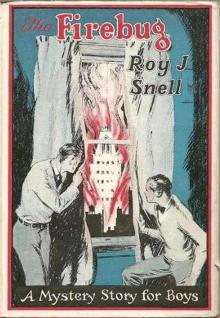 The Firebug
The Firebug Minnie Brown; or, The Gentle Girl
Minnie Brown; or, The Gentle Girl Jack the Hunchback: A Story of Adventure on the Coast of Maine
Jack the Hunchback: A Story of Adventure on the Coast of Maine The Silent Alarm
The Silent Alarm The Arrow of Fire
The Arrow of Fire The Magic Curtain
The Magic Curtain The Crystal Ball
The Crystal Ball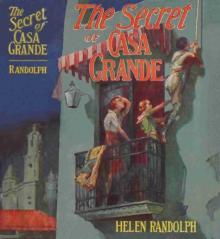 The Secret of Casa Grande
The Secret of Casa Grande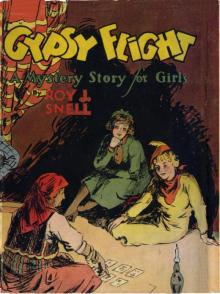 Gypsy Flight
Gypsy Flight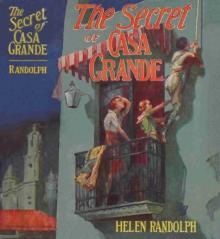 The Mystery of Carlitos
The Mystery of Carlitos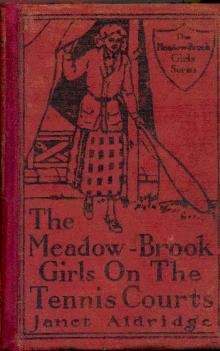 The Meadow-Brook Girls on the Tennis Courts; Or, Winning Out in the Big Tournament
The Meadow-Brook Girls on the Tennis Courts; Or, Winning Out in the Big Tournament Witches Cove
Witches Cove Riddle of the Storm
Riddle of the Storm Forbidden Cargoes
Forbidden Cargoes Green Eyes
Green Eyes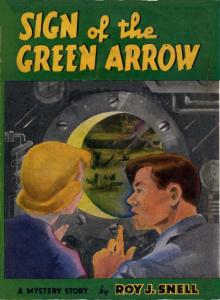 Sign of the Green Arrow
Sign of the Green Arrow The Red Lure
The Red Lure The Light Keepers: A Story of the United States Light-house Service
The Light Keepers: A Story of the United States Light-house Service A Ticket to Adventure
A Ticket to Adventure Helen in the Editor's Chair
Helen in the Editor's Chair Blue Envelope
Blue Envelope The Purple Flame
The Purple Flame Whispers at Dawn; Or, The Eye
Whispers at Dawn; Or, The Eye The Rope of Gold
The Rope of Gold Crossed Trails in Mexico
Crossed Trails in Mexico The Shadow Passes
The Shadow Passes Red Dynamite
Red Dynamite Blue Grass Seminary Girls on the Water
Blue Grass Seminary Girls on the Water The Cruise of the O Moo
The Cruise of the O Moo